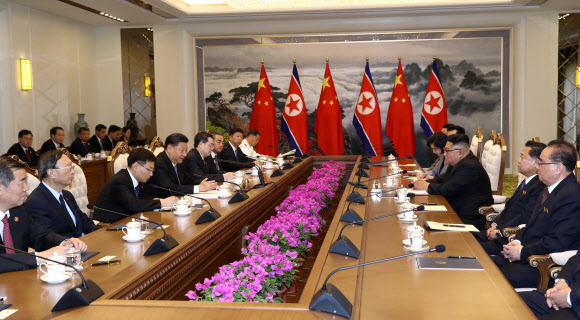 |
|
Xi Jinping, Chinese president holds talks with Kim Jong Un, chairman of the Workers‘‘ Party of Korea (WPK) and chairman of the State Affairs Commission of the Democratic People‘‘s Republic of Korea (DPRK), in Pyongyang, DPRK, June 20, 2019. (Xinhua)
|
Absence of former N. Korean chief negotiator indicates shift in Pyongyang’s US strategy
Kim Yong-chol, vice chairman of the Workers’ Party of Korea (WPK) Central Committee, was confirmed to have been absent at the fifth summit between North Korean leader Kim Jong-un and Chinese President Xi Jinping, which was held on June 20 at the Kumsusan State Guesthouse in Pyongyang. Kim Yong-chol’s absence is seen as a notable change, as he was present for all four of the past summits between Kim Jong-un and Xi. A source familiar with the situation called it “a sign that we can safely say Kim Yong-chol will no longer be performing the role of a window for negotiations with the US.” Another noteworthy development in connection with this is the change in North Korean Foreign Minister Ri Yong-ho’s stature. In a June 21 report on the previous day’s North Korea-China summit published on pages 4 and 5 of the Rodong Sinmun newspaper, Ri was listed as a North Korean attendee ahead of WPK Central Committee Vice Chairman for diplomatic affairs Ri Su-yong, who outranks him in the power hierarchy. Kim Yong-chol was also absent at the Apr. 25 summit between Kim Jong-un and Russian President Vladimir Putin, while Ri Yong-ho and Vice Foreign Minister Choe Son-hui were present. On this basis, observers are speculating that the role of Kim Jong-un’s proxy in foreign negotiations may have passed from Kim Yong-chol to Ri Yong-ho. A South Korean government official said the “question of whether [Kim Yong-chol] was replaced needs to be confirmed,” but added, “If it’s true, it wouldn’t be a bad signal.” The US has been open about its displeasure with Kim – a former military figure with an “old-fashioned” style – and its desire to see him replaced. Figures from the economic and military fields stood out among the summit attendees on June 20. North Korea’s diplomatic perspective was represented by Choe Ryong-hae, first vice director of the State Affairs Commission and North Korea’s “second-in-command,” Foreign Minister Ri Yong-ho, and Vice Foreign Minister Ri Su-yong; while Kim Jae-ryong, who oversees economic affairs as Prime Minister; and Kim Su-gil, director of the People’s Army General Political Department, represented its economic stance. On the Chinese side, the summit was attended by Ding Xuexiang, equivalent to Xi’s chief of staff as executive director of the General Office of the Chinese Communist Party (CCP); Yang Jiechi, a CCP Political Bureau member in charge of diplomatic affairs; Foreign Minister Wang Yi; He Lifeng, who oversees economic strategy as chairman of the National Development and Reform Commission; and Commerce Minister Zhong Shan. In an unusual development, they were accompanied by Miao Hua, director of the Political Work Department of the Central Military Commission. China indicates support for economic cooperation with N. Korea Analysts read He and Zhong’s presence as signaling China’s commitment to pursuing economic cooperation with North Korea and supporting North Korea’s economic development within the framework of current sanctions. “During the summit, President Xi said he would ‘strengthen the areas of the economy and livelihoods, education for officials, and human exchanges,’ while stressing cooperation in the areas of education, hygiene, sports, the media, and provincial regions in honor of the 70th anniversary of diplomatic relations [with North Korea],” noted Yang Gap-yong, a research fellow at the Institute for National Security Strategy (INSS). “This means that human exchanges, tourism, and other areas will be heavily increased to provide economic support within the sanctions framework and share [China’s] experience with economic development,” Yang explained. The presence of Kim Su-gil and Miao Hua from the military prompted speculation over a possible connection with Xi’s remarks about “helping to resolve the North’s legitimate security concerns,” as well as the role of the military in economic construction. “Miao Hua is an associate of Xi Jinping who is in charge of personnel and ideas for the military,” explained Yang. “For North Korea to pursue reforms and openness as it shifts from a two-track course of pursuing nuclear and economic development to one of channeling energies into building the economy would require the support and a change in mindset from the military,” he added. “The significance of [Miao’s presence] appears to lie in sharing China’s related experiences.” By Lee Je-hun, senior staff writer, and Park Min-hee, staff reporter Please direct comments or questions to [english@hani.co.kr]





